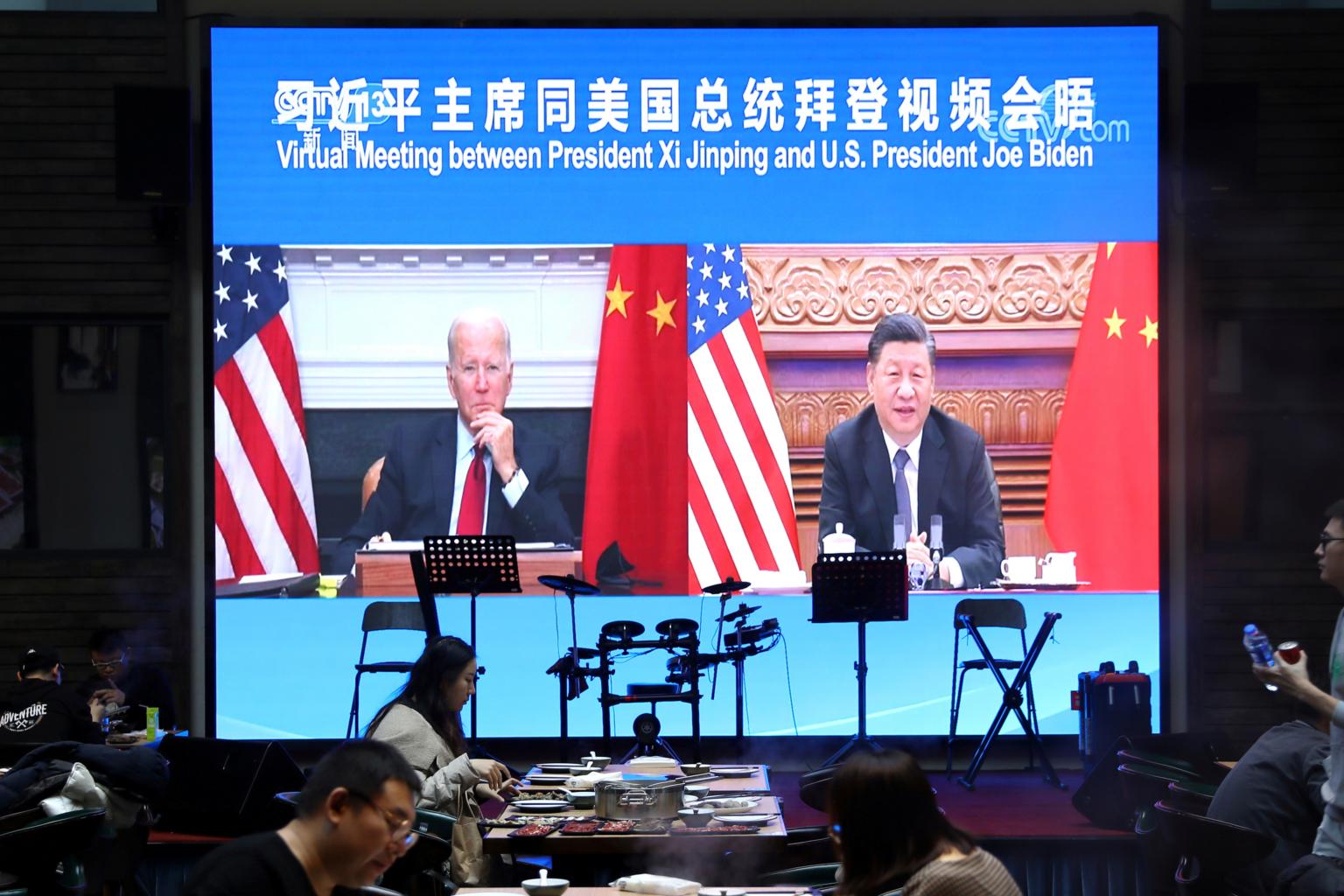Biden and Xi agree to look at possible arms control talks
Sign up now: Get insights on Asia's fast-moving developments

Chinese President Xi Jinping attending a virtual meeting with U.S. President Joe Biden via video link, on Nov 16, 2021.
PHOTO: REUTERS
WASHINGTON/BEIJING (REUTERS) - United States President Joe Biden and Chinese leader Xi Jinping agreed at a virtual meeting to look into the possibility of arms control talks, US national security adviser Jake Sullivan said on Tuesday (Nov 16).
Mr Biden and President Xi agreed to "look to begin to carry forward discussion on strategic stability", Mr Sullivan said in a reference to US concerns about China's nuclear and missile build-up.
"You will see at multiple levels an intensification of the engagement to ensure that there are guard rails around this competition so that it doesn't veer off into conflict," Mr Sullivan said in a Brookings Institution webinar.
He did not elaborate on what form the discussions on strategic stability could take, but went on to say: "That is not the same as what we have in the Russian context with the formal strategic stability dialogue. That is far more mature, has a much deeper history to it.
"There's less maturity to that in the US-China relationship, but the two leaders did discuss these issues and it is now incumbent on us to think about the most productive way to carry it forward."
Washington has repeatedly urged China to join it and Russia in a new arms control treaty.
Beijing says the arsenals of the other two countries dwarf its own. It says it is ready to conduct bilateral dialogues on strategic security "on the basis of equality and mutual respect". It was the two leaders' most in-depth exchange since Mr Biden took office in January.
Meanwhile, China and the US will ease restrictions on access for journalists from each other's countries, Chinese state media and the US State Department said on Tuesday.
The official China Daily newspaper cited unidentified Chinese Foreign Ministry sources as saying that a consensus on journalist visas, among other points, was reached before the virtual summit between Mr Xi and Mr Biden.
Tensions between the world's top two economies on issues ranging from tech and trade to human rights and the coronavirus spilled over into the media last year.
Beijing accused Washington of a political crackdown on Chinese journalists after it slashed the number of Chinese nationals allowed to work at the US offices of major Chinese state-owned media and limited their authorised stay to 90 days, with an option to extend.
In the tit-for-tat row, China then expelled US journalists from several US newspapers and introduced new visa restrictions on some US media companies.
Under the consensus reached, the US will issue one-year multiple-entry visas to Chinese journalists, China Daily said, adding that the Chinese side has committed to granting equal treatment to US journalists once the US policies come into force.
Both countries will issue visas to journalists based on applicable laws and regulations, it said, adding that journalists will be able to depart freely and return under strict compliance with Covid-19 protocols.
A spokesman for the US State Department gave similar details, saying that China had committed to permit US journalists already in the country to depart freely and return, which they had previously been unable to do. It said the US planned to facilitate similar treatment for Chinese journalists.
"We welcome this progress but see it simply as initial steps," the spokesman said, adding in reference to the People's Republic of China: "The media environment in the PRC has deteriorated significantly in recent years."
China's Ministry of Foreign Affairs did not immediately respond to a request for comment.
Although the they spoke for more than three hours, the two leaders appeared to do little to narrow differences that have raised fears of an eventual conflict between the two superpowers.
The US had envisioned the meeting putting stability into a relationship increasingly troubled over a litany of issues, including what Washington views as Beijing's aggressive actions towards Chinese-claimed Taiwan.
Asked if there was any progress on tensions over the self-ruled island, Mr Biden said: "Yes. We made very clear we support the Taiwan act and that's it."
Mr Biden was referring to the Taiwan Relations Act, a US law that requires the US to provide Taiwan with the means to defend itself, though Washington has long followed a policy of strategic ambiguity on whether it would intervene militarily in the event of a Chinese attack.
"I said that they have to decide... Taiwan, not us," Mr Biden added later. "We are not encouraging independence."
Mr Xi told Mr Biden in their meeting that China would take decisive measures in the event that Taiwan crosses Beijing's red line in seeking independence.
Mr Sullivan said Mr Xi and Mr Biden discussed a broad range of global economic issues, including how the US and China can work together to ensure world energy supply and price volatility do not imperil the global economic recovery.
In the meeting, Mr Biden pressed his Chinese counterpart on human rights and Mr Xi warned that China would respond to provocations on Taiwan.
A senior US official said in a briefing after the meeting that the US aim was not to ease tensions, nor necessarily was that the result, and there were no breakthroughs to report.


